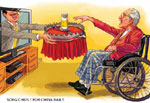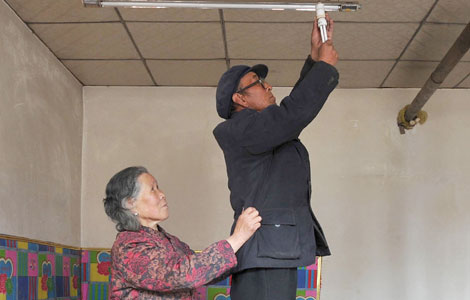Let taxi fare reform be fair
Updated: 2013-05-24 07:15
By He Bolin (China Daily)
|
|||||||||||
The Beijing planning body and transportation authorities held a public hearing on Thursday to address taxi drivers' complaints against low income and make it easier for people to hail a cab, especially during rush-hour traffic.
Earlier this month, the Beijing municipal commission of development and reform issued a set of proposals to raise taxi fares in order to increase cabbies' incomes by 1,400 yuan ($226) to 2,300 yuan a month so that their total earnings add up to 6,000 yuan to 6,800 yuan a month. The proposals include raising the fare for a trip of less than 3 kilometers to 13 yuan, with 2.3 yuan or 2.6 yuan for every km after that and a fuel surcharge of 1 yuan. Plus, the fare for a 2-km journey is to be added to the total for every 5 minutes a taxi waits in the traffic.
The authorities hope that raising taxi fares will make it easier for people to hail a cab during rush hours, between 7 am and 9 am, and between 5 pm and 7 pm, because cabbies will have greater incentive in picking up passengers during those periods. Taxi drivers' incomes could fall by up to 62 percent during rush-hour traffic and that's why many of them choose to take a break during the time and thus make it very difficult for people to get a cab.
However, the higher taxi fare during rush hours may have the undesirable effect of prompting more people to use private cars, because a journey of less than 3 km that takes about half an hour now costs 24 yuan whereas after the proposals are approved it will cost at least 41 yuan.
The most controversial factor in the new proposals is that the public will have to bear the burden of the fare hike because the amount cabbies pay to their companies - and which takes away a big chunk of their income - remains unchanged in this round of reform.
Many cabbies have complained against the monthly rental fees of more than 8,000 yuan for a taxi running two shifts and 4,000 yuan for one plying only during the day. The 200-odd taxi companies in the city make an estimated 5.568 billion yuan a year through rental fees, while on average a driver earns only about 48,000 yuan a year.
The taxi companies argue that the rental fees are fair given the "very complicated and difficult work" of operating and managing a fleet of taxis. In fact, the taxi companies take away 65 percent of the total income of cabbies, which is unreasonable and exploitative. Reducing the rental fees would, therefore, raise the incomes of cabbies without passing the full cost of the fare hike on to passengers.
Besides rental fees, cabbies also have to pay other charges such as the guarantee money to taxi companies, which add to their burden. The reduction in the rental fees should thus be high. First of all, one does not need large-scale investment to run a fleet of taxis. And taxi companies can recover the cost of buying a car through rental fees in less than a year. Second, the taxi service sector is not a high-tech industry and access to it is relatively easy. The only problem is that it is controlled by a handful of companies.
Most people would not begrudge paying a slightly higher taxi fare given that taxi fares in Beijing have remained unchanged for seven years while people's incomes have steadily grown.
Officials in Beijing should not follow the examples set by cities such as Chongqing and Shanghai, where taxi drivers' interests were often sacrificed in favor of the taxi companies, forcing cabbies to go on strikes. The resultant reduction in rental fees and concessionary measures, such as new surcharges introduced by local governments, wiped out the drivers' gains in favor of the taxi companies.
With taxi companies' interests remaining unchallenged, reform will have little or no effect on the monopoly in the taxi service sector and harm the interests of drivers and the public both.
Like any other public issue, reform of the taxi service sector requires serious discussion and more attention should be paid to such aspects as balancing the interests of all parties, breaking the factors of administrative monopoly and ensuring that drivers earn enough money to lead a decent life. If all these aspects are accounted for, monopoly profits can be released to cover the interests of drivers and passengers both.
The author is a reporter with China Daily.
Related Stories
Taxi fare increase finds support at hearing 2013-05-24 07:12
Beijing holds hearing on taxi fares hike 2013-05-24 01:26
Public hearing to discuss taxi fare increase 2013-05-08 07:59
Beijing to hike taxi fares 2013-05-07 23:31
Beijing planners move to make fare deal on taxis 2013-05-06 07:13
Today's Top News
Germany to pay $1b for ageing Holocaust victims
Beijing seeks cooperation with US on cyberattacks
China to speed up service growth
Infant's fall in pipe probed
Developer invests $1.5b in London
Schoolchildren taught to avoid sexual assault
Traffickers await appeal verdict
Female condoms, a new choice
Hot Topics
Lunar probe , China growth forecasts, Emission rules get tougher, China seen through 'colored lens', International board,
Editor's Picks

|

|

|

|

|

|





